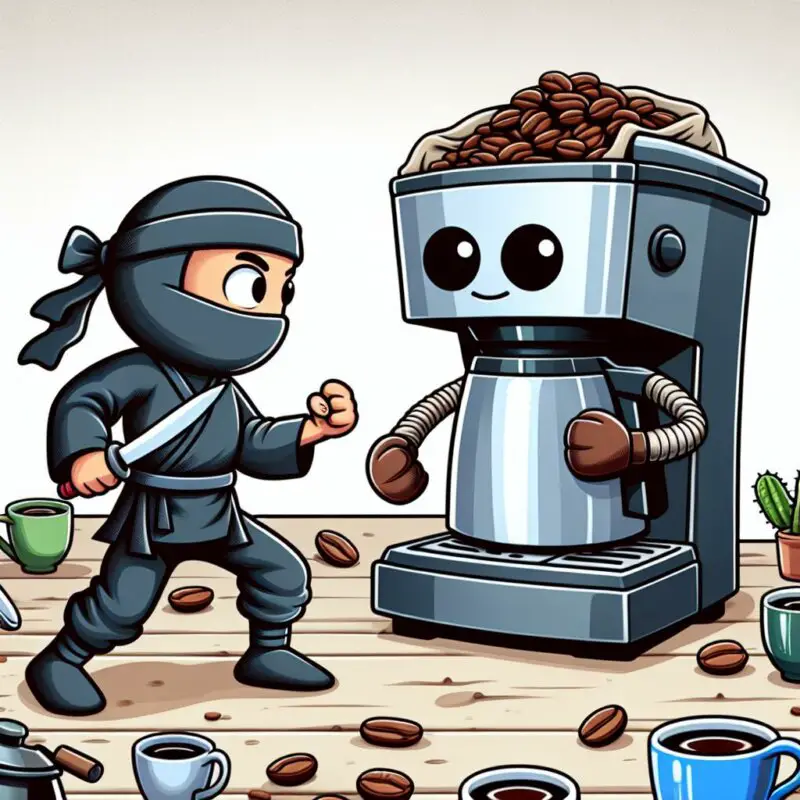This post may contain affiliate links. Please read my disclosure for more info.
Coffee isn’t just about the caffeine kick. It’s meant to delight you with its tastes, smells, and feel. But, if it’s too bitter, it can spoil what should be a pleasant moment.
Great news for coffee lovers! You can easily make your coffee less bitter with a few simple tricks. These tips will enhance your coffee’s natural taste, letting you enjoy its true flavors without adding any unhealthy sweeteners or artificial stuff. Get ready for a better coffee experience!
Should Coffee Taste Bitter?
A touch of bitterness in your coffee can actually make it taste better! It balances the coffee’s acidity and sweetness, adding a rich depth to your cup. But be careful – trying too hard to cut down on bitterness might leave your coffee tasting sour, and that’s not so nice. Bitterness is only an issue if it overpowers everything else or clashes with the coffee’s other flavors.
Why Is My Coffee Bitter?

Bad coffee grounds and over-extraction often lead to bitter coffee flavors.
Bad coffee grounds
When coffee grounds spoil, they drop their rich and sweet flavors, leaving a bitter taste that shouldn’t ruin your morning coffee experience.
Ever wondered why some coffee tastes bitter right off the bat? It’s all about the beans! The type and quality really do make a difference. Often, if it’s cheap, there’s a reason – and it’s not usually a good one for your taste buds.
Over-extraction of coffee grounds
Even the sweetest coffee can turn bitter if not brewed right. It’s all about the grounds!
When brewing coffee, the aim is to capture all the delicious flavors without the bitterness. If you don’t extract enough, your coffee will taste sour. But, if you extract too much, it turns bitter. It’s all about finding that perfect balance.
How to Make Less Bitter Coffee
Stop buying pre-ground coffee
Ground coffee spoils quicker than whole beans. Why? Because the enemies of coffee freshness are light and oxygen, which attack coffee at its surface. Ground coffee, having a larger surface area, falls victim to these factors more easily.
Keep your coffee beans fresh by storing them in a tight container away from light and moisture. Remember, ground coffee quickly loses its freshness within hours or days, unlike whole beans which can stay fresh for weeks or months when stored right.
For smoother coffee, get whole beans and master grinding your own. It’s a game-changer!
Use the right grind size

The size of your coffee grounds matters a lot! Fine grounds extract flavors quickly and thoroughly, while coarser ones take their time. To get the best taste, adjust your grinder to match your brewing style. For drip coffee lovers, a medium grind is your sweet spot.
Many coffee lovers invest more in their coffee machines than in their grinders, but it’s the grinder that really shapes your coffee’s taste. Using a blade grinder? You’ll end up with uneven coffee grounds. This mix means some of your coffee will be too bitter, while other parts might taste weak. A good grinder ensures every sip is just right.
Discover the perfect coffee grinder without breaking the bank! It’ll transform your coffee into a deliciously smooth experience.
Use more coffee grounds

Many believe that bitter coffee means it’s strong, leading them to use less coffee grounds to avoid bitterness. However, this approach often backfires, making the coffee taste even worse. Let’s explore how to truly enhance your brew.
When making coffee, using too few grounds can make your drink bitter because the water pulls out flavors it shouldn’t. For a perfect cup of drip coffee, aim for a coffee-to-water ratio between 1:15 and 1:17. So, for an 8-ounce cup, you’ll need roughly 1.5 scoops of grounds. This balance is key for a delicious brew!
Discover the perfect coffee balance! Check out my coffee-to-water ratio calculator for an easy guide.
Buy better quality coffee beans
Ever wonder why some coffee tastes bitter? It’s often because the beans aren’t fresh. When you pick up coffee from the grocery store, chances are those beans have been waiting around in warehouses or on shelves way too long. While some brands pack their beans to stay fresh longer, most budget-friendly options don’t prioritize longevity. So, freshness is key to avoiding that bitter taste!
To enjoy a great cup of coffee, it’s not just about using fresh beans. The type and quality of the beans play a huge role in taste. Robusta beans, often found in budget-friendly blends, tend to be more bitter compared to Arabica. But not all Arabica is the same; lower-priced 100% Arabica blends usually don’t use the top-notch beans.
Coffee makers have some sneaky ways to disguise low-quality or old coffee. They might add flavors to hide the bitter taste. It’s not that all flavored coffees are bad – there are some great ones out there, but you’re unlikely to find them in your average supermarket. Also, some brands mix in a little bit of high-quality coffee and call it a fancy blend, like Kona, even though you can’t really taste the special Kona coffee beans amongst the not-so-great coffee.
This site is all about exploring amazing coffees from around the globe. Yes, they might cost a bit more than your usual Folgers or Maxwell House picks, but trust me, you don’t need to spend a fortune to enjoy coffee that’s rich in flavor and smooth, not bitter.
Change the brewing temperature

Using hot water? Be careful! Too hot, and you’ll pull out too much from your coffee beans, leaving you with a bitter brew. Match the temperature to your brewing method for the perfect cup!
Many drip coffee machines won’t let you change the water’s heat. If yours is like that, this tip might not help. But, if you can adjust the temperature, experiment with a slightly cooler setting than you usually use. It could make a difference!
For perfect drip coffee, aim for hot water between 195–205°F.
Clean your equipment

Coffee can leave behind oils and bits that make your next cup taste old. Water adds minerals that change your coffee’s flavor, too. Clean your pot after every use, just like any plate or cup. Plus, don’t forget to clean out your coffee maker often to keep your brews fresh and tasty!
To keep your coffee tasting its best, aim to descale your machine monthly. If your water’s hard or you brew often, you might need to do it more often. This simple step can make a big difference!
Try a new brewing method
Most drip coffee makers fall short in brewing great coffee. Automatic pour-over coffee makers, however, offer a simple alternative. They manage the brewing more effectively, ensuring your coffee is always less bitter and tastes better.
Dare to explore beyond your usual drip coffee? Discover various brewing methods that can elevate your coffee game. While pour-overs might challenge you, investing in an espresso machine can also offer a luxurious twist.
Discover affordable, user-friendly coffee makers for less than $100 today.
Better Not Bitter
Coffee should make your morning delightful with its rich flavors. If it tastes bitter, it might be due to poor-quality beans or brewing it too long. But don’t worry, you can easily fix these issues with some handy tips.
Bitter coffee shouldn’t be your morning norm. Think that’s all coffee can be? I challenge you to try something new. Start by getting some high-quality Costa Rican coffee beans. Add a burr grinder and an AeroPress to your shopping list. Brew a single cup of AeroPress espresso using those freshly ground beans. You’ll be surprised by its smooth, sweet flavor. It’s a coffee revelation that’s anything but bitter.




